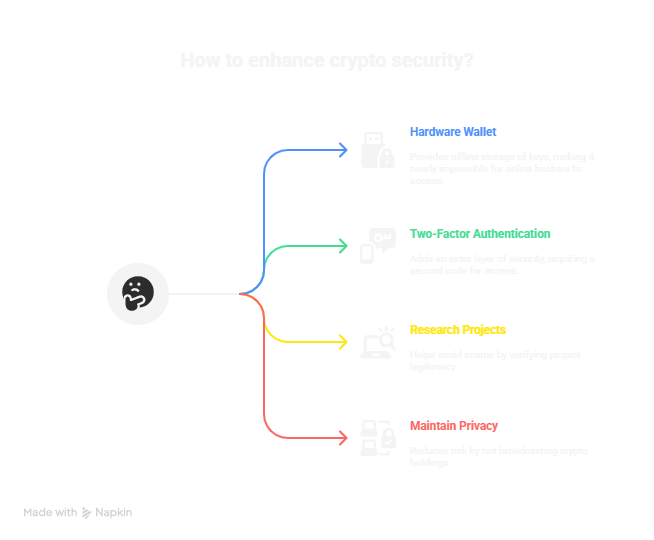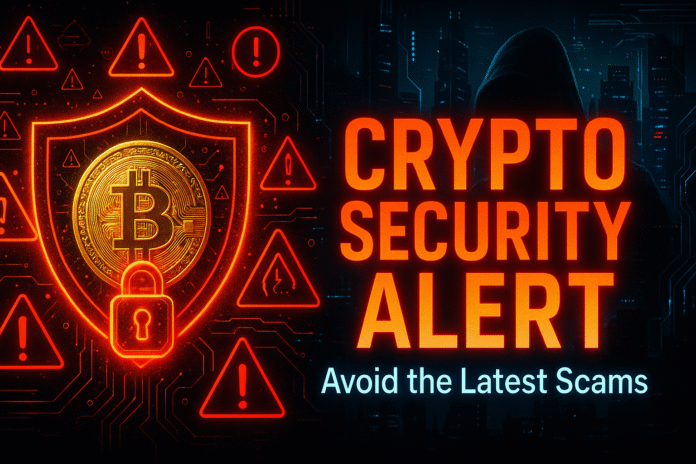Introduction
Crypto Security Alert – Let’s talk about something really important. You know that feeling when you first learn about crypto? It feels like you’ve just discovered a brand new world, right? Full of opportunity, cool technology, and a chance to be part of something big. It’s like finding a super cool, secret club. But just like any popular club, there are always a few shady people hanging around outside, trying to trick their way in.
I’ll be honest, when I was first getting into crypto, I was so excited about the potential gains that I didn’t think much about security. I’m a bit of a “learn by doing” person, and while that works for some things, in crypto, it can be a fast track to a huge, costly mistake. It seems to me that the crypto world is a bit like the internet in the early days. There’s a lot of freedom, but you also have to be smart and aware of the bad guys.
I’ve had friends who lost a lot of money to scams, and it’s a terrible feeling. That’s why I want to share this Crypto Security Alert with you. The goal isn’t to scare you but to help you stay safe in the crypto world. Knowing how to spot and avoid crypto scams is just as important as understanding how to buy or trade.
So, let’s talk about how to stay safe. It’s not about being scared; it’s about being smart.
Table of Contents
The One Golden Rule for Crypto Security Alert You Must Never Forget
Before we get into the details, I want to give you one single piece of advice. If you can only remember one thing from this entire blog post, make it this:
Never, ever, ever give anyone your private key or your recovery phrase.
Seriously. Your private key is like the master key to your house, and your recovery phrase is a magic list of words that can unlock every door in your house, even if you lose the master key. No one—not an exchange support team, not a project founder, not your favorite YouTuber, and especially not some random person who DMs you—needs this information.
Anyone who asks for it is a scammer. No exceptions. This is the number one rule if you want to stay safe in the crypto world. Most people who fall victim to hacks or fraud didn’t lose money because of complicated code or advanced hacking—they simply handed over their keys to a scammer. If you learn to spot these tricks and avoid crypto scams, you’ll already be way ahead of the game.
So, whenever you see a crypto security alert online or hear about a new scam spreading in the community, remind yourself of this golden rule. Believe me, if you remember nothing else, this one principle will protect you from almost every scam.
How Scammers Try to Trick You (The Latest Scams)

Scammers are always changing their tricks, but they generally fall into a few simple categories. If you know what they look like, you’ll be able to spot them and avoid crypto scams from a mile away.
1. The Fake Website Scam (Phishing)
This is a classic trick for Crypto Security Alert. Phishing is when a scammer pretends to be a website you already know and trust to steal your info.
- How it works: You’re scrolling on social media or checking your email, and you see a message that looks like it’s from a place you use, like a crypto exchange (Binance, CoinDCX) or a new project. The message might say, “Your account is locked!” or “Click here to claim a free airdrop!” The link they give you takes you to a fake website that looks exactly like the real one. They want you to type in your password or your recovery phrase. The second you do, they have your info, and they steal all your crypto.
- How to avoid it: Always check the website address. Scammers will use addresses that look very similar, but with a small change (like binancce.com instead of binance.com). A really smart habit is to never click on links in messages. Just go to the real website yourself by typing the address directly into your browser.
2. The “Free Money” Scam (Wallet Drainers)
For Crypto Security Alert This one is a lot sneakier and is very common right now, especially for people interested in new NFT projects or DeFi apps.
- How it works: You see a post about a super cool new NFT or a free token giveaway. You click the link, and the website looks amazing. It asks you to “connect your wallet” to claim the free item. You agree, and a pop-up asks you to “approve” a transaction. What you don’t realize is that this “approval” isn’t for the free item; it’s a contract that gives the scammer the power to empty your entire wallet. It’s a one-time permission that gives them total, long-term access. It’s a horrible feeling when you realize what you’ve done.
- How to avoid it: This is the most important part of being a detective in the crypto world. Never, ever connect your main wallet to a site you don’t know and trust completely. For new projects or airdrops, use a separate, small “burner” wallet that only has a little bit of crypto in it. This way, if something goes wrong, they can only take the small amount you have in that one wallet.
3. The “New Friend” Scam (Pig Butchering)
This scam is probably the most terrible because it uses emotions to get to you. The name “pig butchering” is awful, but that’s what scammers call it because they “fatten up the pig” with fake profits before they steal everything.
- How it works: A scammer will contact you on a dating app, Instagram, or even LinkedIn, pretending to be a new friend or even a love interest. They build your trust over weeks or months. Then, they start talking about a “secret” crypto investment that’s making them a ton of money. They’ll show you fake screenshots of their profits and convince you to invest a small amount on their fake platform. They’ll even let you “withdraw” a small amount of profit to make you believe it’s real. Once you’re fully committed, they’ll convince you to put in a lot of money. When you try to withdraw the large amount, they’ll lock your account and demand a “tax” or a “fee” before disappearing.
- How to avoid it: To Avoid Crypto Security Alert This is a tough one, but the rule is simple: if someone you meet online starts talking to you about crypto investments, it’s a huge red flag. A real relationship is not built on investment tips. Just walk away.
My Personal Crypto Safety Checklist

Okay, so now that we’ve talked about the bad stuff, let’s get to the good stuff. What can you actually do? Think of this as a quick-and-dirty checklist. It’s the stuff I do myself, and believe me, it’s worth the effort if you want to stay safe in the crypto world and avoid crypto scams.
Get a Hardware Wallet
This is a big one. Think of your crypto wallet on your phone or computer as a regular wallet you carry in your back pocket. A hardware wallet is like a bank vault. It’s a tiny physical device, like a USB stick, that keeps your secret keys completely offline. To send crypto, you have to physically press a button on the device itself. This makes it almost impossible for an online hacker to steal your money, because they can’t get to the keys. If you have any amount of crypto you care about, get one. It’s one of the strongest tools for crypto security alerts.
Use Two-Factor Authentication (2FA)
This is so important. Almost every exchange has it. You know how you sometimes get a text with a code to log in to your bank or email? That’s 2FA. It means that even if a scammer gets your password, they can’t get into your account without that second code from your phone. It’s like putting a deadbolt lock on your front door. It takes a few extra seconds to unlock, but it’s a lifesaver. Enabling 2FA is a must if you want to secure your crypto exchange accounts.
Be a Detective (Do Your Own Research)
Let’s be real. There’s always a new project or a new coin promising to make you rich quick. I suspect a lot of scammers rely on our fear of missing out (FOMO) to get us to click on a link without thinking. So, slow down. Before you do anything, check a project’s official website. Read what people are saying on social media. If you can’t find clear answers or if something feels off, just walk away. Doing proper research is the smartest way to avoid crypto scams.
Don’t Brag About Your Crypto
I know it’s exciting to see your crypto go up, and it’s tempting to share with friends or post about it online. But it’s a bad idea. Talking about your crypto makes you a target. It’s a simple habit that can save you a lot of trouble. Just like you don’t walk around with a sign that says “I have a lot of money!”, you shouldn’t broadcast your crypto holdings. Staying private is a huge part of crypto security.
Final Thoughts: Be Smart, Stay Safe
The crypto world is full of incredible new ideas, and it’s exciting to be a part of it. But with that excitement comes a little responsibility. It’s interesting to think that the same things that make crypto so powerful—no central bank, no boss—are the same things that make it a good place for scammers. There’s no customer support line to call if your money is stolen, and there’s no bank that can reverse a transaction.
So, the best defense you have is your own common sense and a little bit of caution. If something sounds too good to be true, it probably is. If a stranger you don’t know is offering you a deal, just walk away. Stay safe in the crypto world by protecting your keys like they’re the most important thing you own. The golden rule of crypto security alerts is simple: never share your private key or recovery phrase.
Remember, most scams can be avoided if you slow down, double-check, and trust your instincts. Keep learning, keep growing, and you’ll be much better prepared to avoid crypto scams.


